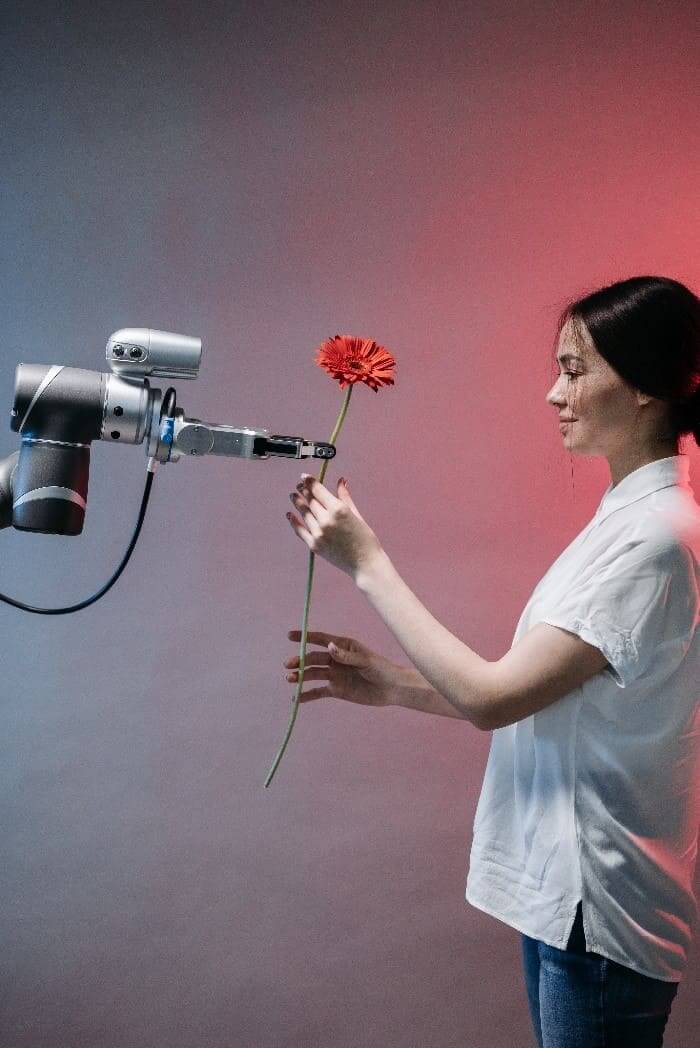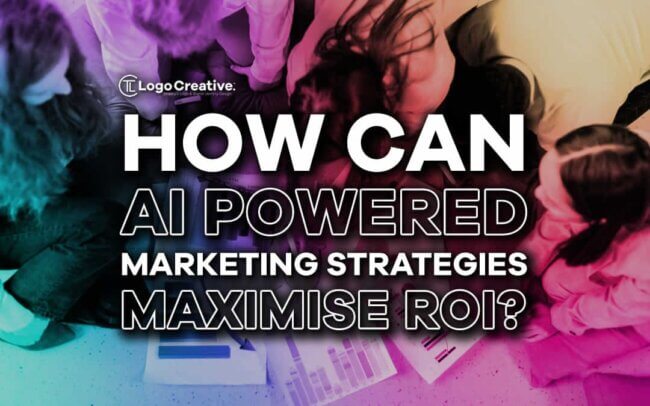As businesses become increasingly data-driven, the use of artificial intelligence (AI) in marketing is gaining traction. In this article we discuss How can AI Powered Marketing Strategies Maximize ROI?
AI technology has the potential to revolutionize the way marketers reach and engage with their customers, leading towards higher return on investment (ROI). This article refers to different AI-powered marketing strategies that can help maximize ROI.
Table of Contents
AI In Content Creation
At the heart of a solid content marketing strategy lies a proper execution plan to ensure that no mistakes are made when channelling content towards a target audience. AI technology is being widely adopted for content creation as it empowers businesses to produce more content and increase website traffic in less time.
With more content, companies attract and engage larger audiences. The application of AI technology to personalize content and engage customers drives higher conversions and revenues.
The improved efficiency and optimization of content creation enabled by AI technology helps companies reach their goals faster and with greater impact.
This explains why AI for content creation is becoming increasingly popular among businesses looking to improve their marketing efforts and drive growth.
Two areas where AI is applied for content creation include AI article blog content and AI video generation. AI tech has evolved to a point where it can produce a full blog article from as little as one keyword.
Generated content is fully SEO optimized ready to rank highly on search engines. AI video generators are applied to create Avatar like interactive and engaging videos for educational content.
AI content creation is an area of development which is impacting businesses of all size and type. However, it is of major benefit to small companies with a limited number of personnel due to their limited resources.
- Dell is using AI to generate product descriptions and other marketing content. By automating the creation process, Dell can produce more content in less time, which can help increase traffic to their website and improve the customer experience.
- Procter & Gamble: Procter & Gamble is using AI to analyse customer feedback and generate product descriptions for their e-commerce website. The AI technology can help Procter & Gamble quickly identify customer preferences and pain points, which can inform the development of more effective marketing strategies.
- Unilever: Unilever is using AI to create personalized content for social media, such as Facebook and Instagram. The AI technology can analyse customer data, such as interests and behaviours, to create content that is more likely to resonate with each individual.
- The New York Times: The New York Times is using AI to create articles, including news summaries and data-driven pieces. The AI technology can quickly analyse large amounts of data and turn it into high-quality, informative articles that are more engaging and accessible to their audience.
Personalized Marketing with AI

One of the most effective ways of maximizing ROI with AI is personalized marketing. AI powered marketing uses data and AI algorithms to create highly targeted campaigns that resonate with selected groups of customers that can go into the detail of each individual customer.
By using data such as demographic information, past purchase history, and browsing behaviour, marketers are able to create highly targeted advertisements and content that speaks directly to each customer’s interests and needs.
Personalized marketing has been shown to increase engagement and conversion rates, ultimately leading to a higher ROI. The following are a few examples of how multinational brands have integrated AI powered marketing as part of their personalized marketing strategy.
- Amazon has leveraged AI to personalize product recommendations for its customers. By using data such as customer browsing and purchase history, Amazon recommends products that are most likely to be of interest to each individual customer.
- Netflix uses AI to personalize its content recommendations for each customer. By analysing customer viewing history, Netflix can suggest content that is most likely to be of interest to each customer.
- Spotify: Spotify leverages AI to personalize its music recommendations for each user. By analysing listening history, Spotify can suggest music that is most likely to be enjoyed by each individual customer.
- Adidas: Adidas uses AI to personalize its product recommendations for each customer. By analysing customer browsing and purchase history, Adidas can recommend products that are most likely to be of interest to each customer.
Predictive Analysis with AI

Another option to maximize ROI with AI powered marketing is through predictive analytics. Predictive analytics involves using AI algorithms to analyse data and make predictions about future customer behaviour.
As an example, predictive analytics is applied to identify which customers are most likely to purchase a product or which products are most likely to sell well in a particular market.
This information is then used to create highly targeted campaigns that reach the right customers at the right time. Predictive analysis through AI is leveraged by market leading businesses. Some examples follow:
- Walmart uses AI to predict customer demand for products. By analysing data such as sales patterns and weather patterns, Walmart can predict which products will sell best in a particular region, allowing the company to optimize its inventory and reduce waste.
- JPMorgan Chase: JPMorgan Chase uses AI to predict which customers are most likely to default on their loans. By analysing data such as credit history, employment history, and spending patterns, JPMorgan Chase can predict which customers are most likely to default on their loans, allowing the company to take proactive measures to reduce risk and increase ROI.
- Salesforce uses AI to predict which customers are most likely to purchase a product. By analysing data such as past purchase history and browsing behaviour, Salesforce can predict which customers are most likely to purchase a product, allowing the company to create highly targeted campaigns.
AI Chatbots
Chatbots are computer programs that can simulate conversation with customers, allowing businesses to provide quick and efficient customer service.
By using AI algorithms, chatbots can also be used to provide personalized recommendations and support to customers, helping to increase customer satisfaction and ultimately leading to a higher ROI. The following are some of the use-cases applied by larger businesses across various sectors.
- Dominos Pizza uses chatbots powered by AI technology to improve the ordering process for customers. Customers can use Dominos’ chatbots to place an order, track their delivery, and receive updates on their order status, all without the need for human interaction.
- Emirates uses chatbots powered by AI technology to provide customers with personalized travel recommendations and improve the booking process. Emirates’ chatbots use data such as customer preferences and flight history to suggest itineraries that are most likely to be of interest to each customer.
- At Royal Bank of Scotland customers can use RBS’s chatbots to ask questions, receive support, and complete transactions, all without the need for human interaction.
AI for Optimizing Ad Spend
Another powerful use-case for AI to maximize ROI is optimization of ad spend. Advertisers can use AI algorithms to analyse data and determine which channels and campaigns are delivering the best results.
This information can then be used to adjust ad spend and allocate resources to the most effective campaigns, leading to increased ROI. Some use-cases follow:
- Facebook uses AI to optimize ad targeting for each customer. By analysing data such as demographic information and browsing behaviour, Facebook’s AI algorithms can determine which customers are most likely to be interested in a particular product or service, allowing the company to allocate ad spend more effectively.
- Uber uses AI to optimize ad targeting for each customer. By analysing data such as demographic information and past ride history, Uber’s AI algorithms can determine which customers are most likely to be interested in a particular product or service, allowing the company to allocate ad spend more effectively and increase ROI.
Conclusion
As described above, market-leading brands across different sectors are embracing and applying AI-powered marketing to maximize their return on investment.
This is primarily being achieved through data-driven analytics that enable the deployment of highly tailored marketing campaigns and an effective ad spend optimization program.
With the adoption of AI driven marketing campaigns across world-leading brands, small businesses, including start-ups, should embrace this tech for their growth ambitions.
It is a no brainer really, as AI enables smaller businesses to scale-up their marketing operations, minimize costs and drive overall business growth.
Join The Logo Community
We hope this has helped in understanding How can AI Powered Marketing Strategies Maximize ROI?. If you would like more personal tips, advice, insights, and access to our community threads and other goodies, join me in our community.
You can comment directly on the posts and have a discussion with Andrew, the Founder of The Logo Creative.
*TIP – We recommend Skillshare to learn online. There are tons of classes for everything including graphic design, web design, marketing, branding and business-related courses. Get a free trial with our link and you won’t regret it Trust us!


